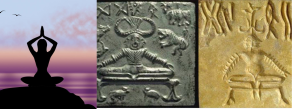Yoga
The word Yoga literally means ‘Union’ or ‘To Unite’ as derived from its root word ‘Yuj’ which means essentially the same. Thus, Yoga is a science of union. Be it the union of body and mind, physical and mental aspects, gross and subtle, or at a higher level, ‘Soul and The Infinite’. In addition to living in harmony and freedom in all spheres of life, viz., health, finances, mental, social, etc., the unity of the little self with the greater self, termed as self-realization, also called Moksha, Kevalya, etc., is the ultimate goal of the science of Yoga. This includes following certain practices and techniques and various physical, mental, and psychological disciplines developed by many ancient and modern seers and yogis of India and the world. Today, this science has become quite popular among every living culture, benefitting every individual and society embracing it.
History And Development
The science of yoga originated thousands of years ago in India, long before the various famous civilizations were even born. Lord Shiva, one of the Gods in the Hindu trinity, is considered the first yogi of the world, The Adiyogi. Several seals and other historical artifacts were found in the remains of the Indus Valley Civilization as well as other places, depicting yogis in various yogic postures, confirming the popularity of this ancient science in ancient times. The Vedas, Upanishads, several Buddhist and Jain texts, the epics of Ramayana and Mahabharata, the Shaiva, Vaishnava, and Tantric traditions, all talk of yoga. The great sage Patanjali systematically organized the existing practices of yoga through his Yog Sutras. Thereafter, many sages and masters contributed to the development of this science through their documented practices and literature.

Seal from Indus Valley excavation depicting Yogic Poses
Modern Practices And Relevance
The philosophy of yoga is as relevant in modern times as it was in ancient and medieval times, even more. Its practices and techniques are equally powerful and effective as those were at the time of its inception. In today`s world, where stress, worries, and other inharmonies have taken over the human consciousness, yoga provides a better way to deal with them. Modern day yoga practices have evolved a lot as per the requirements of the modern day life of humans. But the essence and sum of the philosophy has remained unaltered to its core. Thus, in modern era, it has already travelled from the jungles of the Himalayas to the busy metropoles of India and the world, and is further expanding its sphere in almost every field.

Conclusion
Be it physical, mental, or spiritual well-being, yogic practices, and techniques offer an excellent option for overall simultaneous growth. Millions of people have benefitted from the ancient science of yoga and will continue to be benefitted. Thus, yoga, like any other scientific philosophy based on the universal laws of nature, was, is, and will be relevant and useful to humankind.



Good info
May I simply say what a comfort to discover someone that really knows what they are talking about on the internet. You actually realize how to bring an issue to light and make it important. More people must look at this and understand this side of the story. I cant believe you are not more popular since you surely have the gift.
Why people still make use of to read news papers when in this technological globe all is presented on web?
You will definitely like it http://fertus.shop/info/
The best prices from the best providers http://fertus.shop/info/
Tucker X
Tucker. Putin Interview X.
Additional earnings on your website http://fertus.shop/info/
Analytics of your website http://fertus.shop/info/
I would like to post an article http://fertus.shop/info/
How to contact the administrator on this issue http://fertus.shop/info/
Shall we exchange links? My website http://fertus.shop/info/
The offer is still valid. Details http://fertus.shop/info/
We offer cooperation on SEO optimization http://fertus.shop/info/
Content for your website http://fertus.shop/info/
Web Development Wizards http://fertus.shop/info/
Can provide a link mass to your website http://fertus.shop/info/
Content for your website http://fertus.shop/info/
Content for your website http://fertus.shop/info/
Can provide a link mass to your website http://fertus.shop/info/
Free analysis of your website http://fertus.shop/info/
I offer mutually beneficial cooperation http://fertus.shop/info/
great article
https://www.instagram.com/asiapsiholog_family/